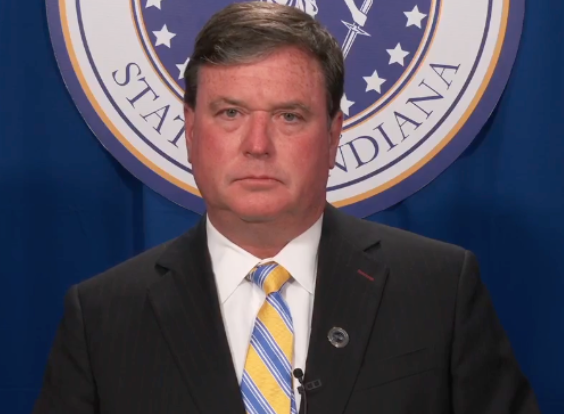By Leslie Bonilla Muñiz
Indiana Capital Chronicle
The Indiana Supreme Court on Thursday publicly reprimanded a defiant Indiana Attorney General Todd Rokita for his televised comments about the doctor who oversaw a medication abortion for a 10-year-old rape victim from Ohio.
Dr. Caitlin Bernard performed an abortion on the girl in June 2022. Although she gave few identifying details when she told the Indianapolis Star about it, the case went national.
In July 2022, Rokita told Fox News commentator Jesse Watters that Bernard was an “abortion activist acting as a doctor — with a history of failing to report.”
In a per curiam opinion, the court’s five justices ruled that Rokita violated two of the Rules of Professional Conduct for lawyers:
- They said Rokita’s comments constituted an “extrajudicial statement” that he knew — or reasonably should’ve known — would be publicly disseminated and would prejudice related legal proceedings.
- They also his statements had “no substantial purpose” other than to embarrass or burden Bernard.
In a sworn affidavit, Rokita admitted to the two violations and acknowledged he couldn’t have defended himself successfully on the charges if the matter were tried.
In exchange for those admissions, the Indiana Supreme Court Disciplinary Commission agreed to dismiss a third charge: intentionally making or directing others to make public statements about the investigation before it was referred to the Medical Licensing Board — which the commission alleged was “in contravention of the duty of confidentiality required” under state law.
The court said Rokita’s “acceptance of responsibility,” cooperation during the disciplinary process and his clean disciplinary history were mitigating factors.
“But that same length of experience also ‘counsels that he should have known better’ than to conduct himself in the manner he did,” the ruling noted.
And the court pointed out that Rokita’s nationally televised comments “had far greater reach” than other disciplinary cases involving public reprimands, which were over news releases and local newspaper letter submissions.
Chief Justice Loretta Rush and Justice Christopher Goff dissented from the public reprimand as punishment because they believed it was “too lenient,” according to the opinion — pointing to Rokita’s position as attorney general and the “scope and breadth” of his misconduct.
Rokita’s response
Although the court cited Rokita’s acceptance and cooperation in handing him a milder punishment, he was unrepentant in a lengthy public statement Thursday.
He defended his televised comments multiple times as “truthful” and “factual” and attacked the news media, medical field and “cancel culture” for their handling of the case against him.

He said those groups vindicated the “abortionist who intentionally exposed personal health information at a political rally, all in furtherance of their shared ideological and business interests.”
“These liberal activists would like to cancel your vote because they hate the fact I stand up for liberty,” Rokita continued.
He said he could’ve fought the case further, but wished instead to save taxpayer money and “distraction” — and noted he had to sign an affidavit “without any modifications” to resolve the matter.
“Now, I will focus even more resources on successfully defending Indiana’s laws, including our pro-life laws, and fighting the mob that silences parents, employees, conservative students, law enforcement, Believers of all faiths, American patriots and free enterprise itself,” Rokita said.
He went on to attack Bernard as an “abortion activist” — mentioning her interview with the Star and her coat hanger tattoo, and accusing her of taking on “pro-abortion” speaking engagements and Statehouse lobbying.
Despite that, Rokita said he had no vendetta against Bernard because his office typically has nearly two-dozen similar cases pending at any given time.
Rokita is the second straight state attorney general to be disciplined for misconduct. The court in May 2020 handed Curtis Hill a 30-day suspension of his law license for committing the criminal act of battery and violating professional conduct rules.
Rokita must pay the court $250 for the costs of the proceedings, and could owe more once the commission determines how much it cost to investigate him. He additionally used public dollars for his defense.
A separate conditional agreement in the case is confidential under court rules.
The Indiana Capital Chronicle is an independent, nonprofit news organization dedicated to giving Hoosiers a comprehensive look inside state government, policy and elections. The site combines daily coverage with in-depth scrutiny, political awareness and insightful commentary.
You can read the original version of the story here.





